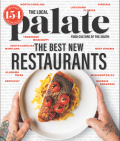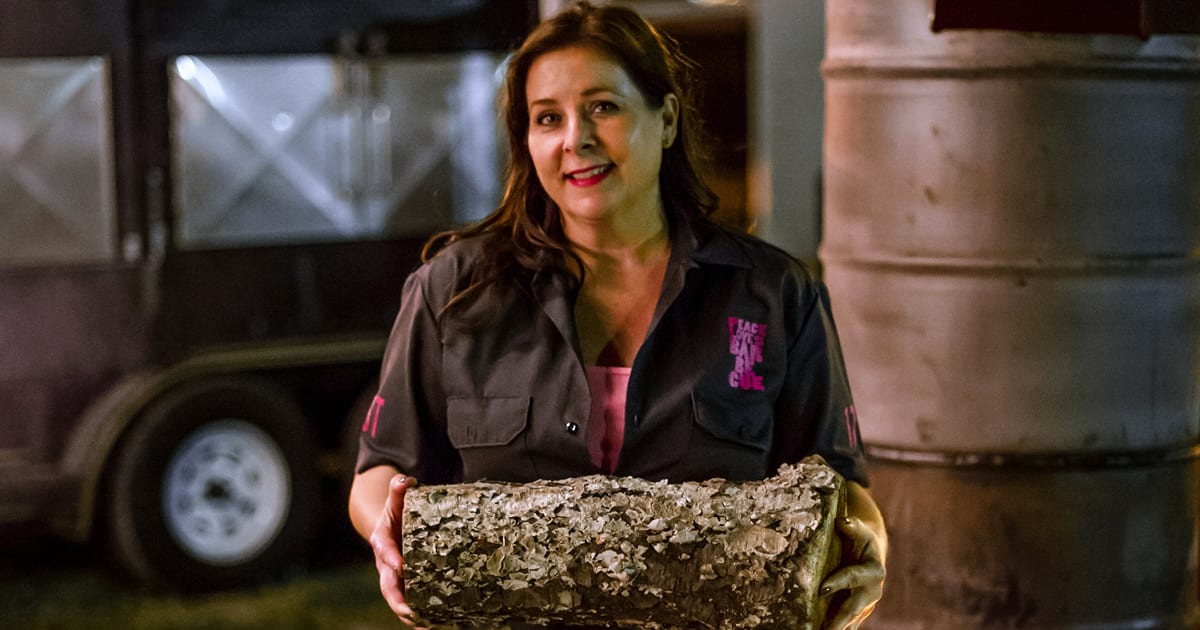Amy Mills, daughter of a legendary pitmaster, picks up the torch in Murphysboro, Illinois
The sleeves of Amy Mills’ emerald green blouse fluttered about her wrists as she placed a plate of smoked sausage slices and pimento cheese onto a table surrounded by burly men wearing hooded sweatshirts and trucker’s caps. Her bright red lips softened into an anxious grin as she scanned the dining room inside her family’s restaurant, 17th Street Barbecue. It was the kick-off dinner of a two-day educational retreat for aspiring barbecue professionals, called Whole Hog Extravaganza and Brisket Bonanza, and Amy, pretty and colorful among a sea of scruffy men, beamed—she was ready to get down to business.
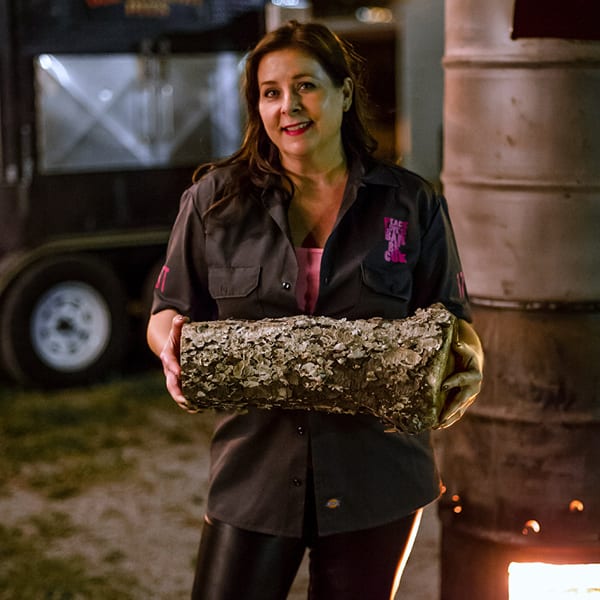
The story of 17th Street, a family-owned barbecue joint set in the flatlands of Southern Illinois, usually revolves around Amy’s father, legendary pitmaster Mike Mills. Thanks to a thirty-plus year career as a barbecue expert, restaurant owner, and consultant, as well as his domination over the barbecue competition circuit—his team, Apple City Barbecue has won four World Champions and three Grand World Champions at the Memphis in May International Festival—Mike has become a god for those looking to learn both the skills and magic that go into making quality barbecue.
But while Mike holds many of the secrets (most of which he’s happy to share), it’s Amy who has managed to package both the restaurant and her father’s role as soothsayer into a blockbuster brand that’s recognized around the barbecue circuit and beyond. A rare female face in the world of smoke, she’s quick to jump into the mix, mopping sauce onto a pig in the pit, loading logs into the fire starter, or cutting ribs at a competition. But she also knows every facet of the back-end of the business, from the company’s growing mail-order business to how and where to source her family’s pigs. If Mike is the boss of the operation, Amy has become the heart, soul, and brains behind 17th Street.
The whole-hog class is one of three two-day intensives that 17th Street runs—there is also a “business of barbecue” and a “catering master class.” During this year’s whole hog event, which took place in January, more than thirty aspiring pit bosses and barbecue cooks took part in a workshop focused on whole hog and brisket cooking. Essentially a crash-course in barbecue, the class, conceptualized and organized by Amy, brings professional pitmasters from every region of the South and beyond to teach students how to prep and cook whole hogs and briskets, among other smoked meat delicacies. This year, they included Carey Bringle from Peg Leg Porker in Nashville and Barry Sorkin of Smoque BBQ in Chicago, among many others. More workshop than classroom, the experience offers up-close and interactive demos for different regional methods of how to break down, prep, season, and smoke whole pigs, which are cooked overnight by the pitmasters and eaten by the group. There are intersessions on how to start a restaurant, how to build a brand, and what it takes to create a cookbook. The students walk away with a long list of new ideas—and bellies full of ’cue.
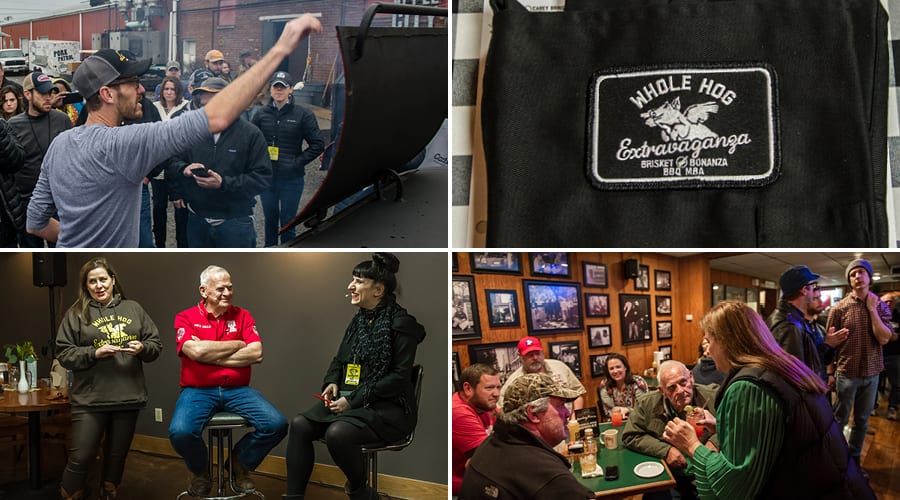
With a background in journalism and advertising, Amy’s been able to put a sheen on the restaurant’s brand, making it a barbecue destination with multi-dimensional appeal that she espouses through the mail-order business, appearances at events around the country, social media, and books.
The first, Peace, Love and Barbecue (Rodale Books), helped tell the story, through her father’s eyes, of the many experts that pepper the world of smoke and meat. The second, released in May, is Praise the Lard (Houghton Mifflin Harcourt). It gives Mike and Amy equal billing, with both voices offering their take on the history of the restaurant, barbecue tips and tricks, stories of the town they call home, and of the legacy they are carrying on.
Like her father, Amy grew up in Murphysboro, which once hummed with commerce and small-town pride. “I had a very classic Southern-Midwest childhood in this really sweet town,” she says. For most of her upbringing, Mike wasn’t a barbecue expert but the operator of a dental lab—a business that still exists today. (Mike has since passed the management over to others.) But he always cooked, Amy says. In high school, he was building barbecue pits. And at the lab, she says he usually kept big vats of chili on the Bunsen burners, bubbling away while he did his work. The UPS man, Amy laughs, would usually wait until lunchtime to make his deliveries, ensuring a free meal on Mike each day.
But much of the town’s hustle and bustle—made up of small mom-and-pop businesses, factories that produced aluminum and clothing, and jobs that relied on the railroads—started to fade with the arrival of big-box stores and a shopping mall in a neighboring town in the late ’80s and early ’90s. “The past few decades have been rough on Murphysboro,” Amy writes in Praise the Lard. “Still, the town remains scrappy, spirited, and fiercely proud.”
Mike eventually purchased a bar called the Corner, which sat in an old gas station, and started making barbecue and doing fish fries on the weekends—he would give away the food to get his customers to buy more beer. More bar than barbecue joint back then, he had regulars who would stop in daily, sometimes twice. Amy’s uncle owned a thriving grocery resale and wholesale business in a warehouse that sits behind the restaurant—almost a century old, the building has survived a tornado and a major fire and is now used for events and holds the company’s offices, catering kitchen, the mail-order business, and Mike’s growing collection of barbecue trophies. Growing up, Amy worked in the warehouse instead of at her father’s bar.
“My dad said, ‘There’s not going to be a job for you in this town.’ He said, ‘You need to go and live and experience something different,’” Amy explains. She ended up leaving home to attend college, where she got a degree in journalism, and then settled in Dallas, Texas, where she started a career in advertising. Later, she moved to Boston where she worked as a copy director for clothing company J. Jill’s catalogues for several years, while also running a company that trained others for speaking and communication skills. She raised her two children on the coast of Massachusetts in a town called Hingham.
Meanwhile, 17th Street was turning into a full-fledged barbecue restaurant due in part to Mike’s discovery of the competition barbecue circuit. He and a few partners started the Murphysboro Barbecue Cook-Off in 1988. Soon after, he started his own team and by 1990, Apple City Barbecue was cooking—and winning grand championships—at Memphis in May. Mike started gaining some serious attention, including from Jeffrey Steingarten, food critic for Vogue, who once served as a judge at the Memphis in May competition—the resulting article in Vogue sang the praises of Mike’s food and helped put 17th Street, and the small town of Murphysboro, on the international barbecue map.
Most notably, though, a couple of Broadway professionals, the producers behind the show, The Producers—who also hold an affinity for barbecue and served as judges on the barbecue circuit—took notice of Mike’s talents. Through a few New York connections, they eventually put Mike in touch with chef Danny Meyer, who brought him on as a consultant and partner to open Blue Smoke, now one of Manhattan’s most well-known barbecue joints. Mike had also opened restaurants in Las Vegas, and would go on to open a second 17th Street in nearby Marion. The buzz was building around the restaurant and Mike had become a relied-upon expert for both amateurs and professionals alike.
Amy has managed to package both the restaurant and her father’s role as soothsayer into a blockbuster brand that’s recognized around the barbecue circuit and beyond.
Amy’s life, in the meantime, had taken a turn. In 2000, she found herself going through a divorce, supporting two small children, and working full-time. She found comfort and escape whenever she returned home to see her dad and spend time at her family’s restaurant.
“I would always do little projects for him, like write this thing or design that thing,” Amy explains. “But I was home at one point during this hard time in my life and he handed me this Post-it note and said, ‘can you call this woman back for me?’ Well, it was a reporter for Martha Stewart Living. So, I called and she said she’d actually called three weeks ago because she’d been working on a mail-order barbecue story, and had already written the piece. I said, ‘Daddy, you have to follow up with those people!’ And slowly, I just started segueing into more and more of that kind of work.”
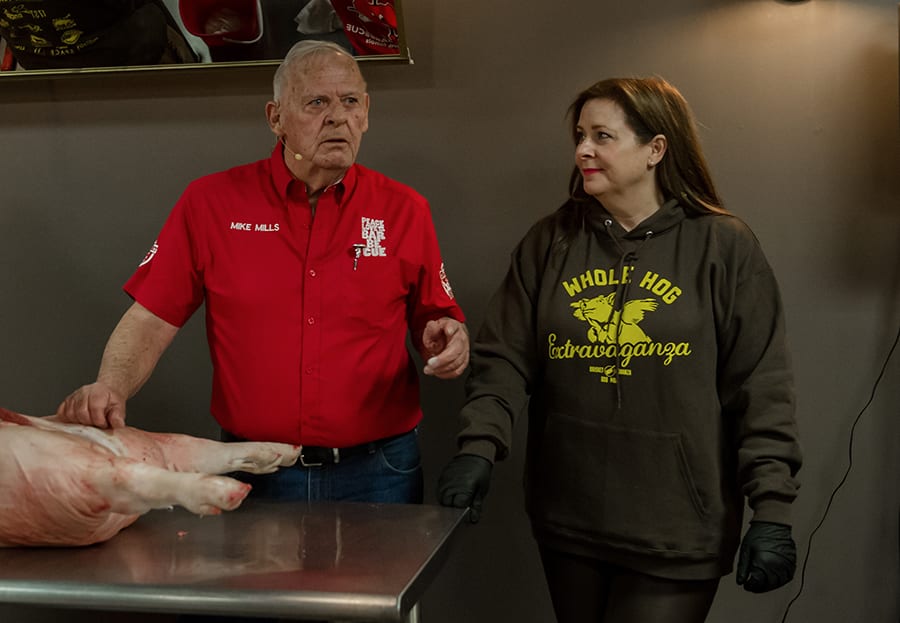
She started visiting home more often and soon came up with the idea for the first book, Peace, Love and Barbecue. Through the writing of it, Amy came to appreciate her father’s many, many stories and barbecue knowledge—as well as how often he was sought out for advice. “People would come here from all over the world and want to sit at the feet of the master and ask questions. My dad will talk to anybody all day long, maybe to the detriment of our business,” Amy laughs. “He will give as much attention to the backyard cook who wants to know his technique as he will to someone who is building an empire. So, I could see that there was a real need for education.”
This past January, Amy and Mike hosted their seventh whole hog class. The professionals on hand showed a range of regional techniques—but came to glean tips from Mike as well. During Mike’s demo, students and pros watched studiously as the master and his small team showed the room how to set a pig into “running hog” style, with the animal laid out on its belly, all four legs bent as though it were crouched and ready to start running, complete with an apple in its mouth and its tail set taut.
The students, who ranged in age from mid-twenties into their sixties and hailed from every corner of the country, including California, Florida, and New England, peppered Mike with questions about when to add the rub, what type of sauce he used, and what type of smoker worked best.
Throughout it all, Amy played hostess and emcee, shuttling the class from one session to the next. Where Mike and the other pitmasters provided the “meat,” Amy added nuance. For example, one of the sessions was led by journalist and author Kat Kinsman, whose recent book, Hi, Anxiety, and her work on the website and social project Chefs With Issues has helped start a dialogue with chefs around mental health and addiction. Kinsman’s talk offered a topic that was both heartfelt and likely unexpected to the group that was otherwise there to get their hands dirty. Another presentation by an architecture and branding firm provided insight into how to think broadly about starting a successful restaurant and brand. More than just a master class on handling whole hogs, the two-day workshop offered a holistic look at what goes into building a barbecue empire, one that is not often or easily shared in the competitive, male-dominated industry.
These days, Amy spends almost as much time in Murphysboro as she does in Hingham. Her kids are grown (one is in college and the other is working as an editor at a magazine in New York) and her work at the restaurant continues to evolve. The company is in the process of taking over another space in town that was built in the 1940s and once served as a car dealership, where they’ll move their product-packaging operation and mail-order business and also open a diner. The hope is to continue to revive a bit of that small-town America—and more importantly, bring jobs back to Murphysboro. In the new book, Amy writes that it will complete “a revolution of our region’s commerce wheel.” Though Mike calls himself semi-retired (basically, Amy says, he works twelve-hour days, not eighteen anymore) he’s not going anywhere soon—but Amy makes it clear that the legacy will live on. She says her own kids, who both spent summers working at the restaurant, have picked up the hospitality gene, too.
“I never dreamed I would come back here myself,” she says. “But because I went away and did all of those other things—because my dad encouraged me to go out and gain all of that experience—I’ve been able to bring so much back to the business. And it’s been a much richer experience for all of us because of that.”
This story originally appeared in the June.July 2017 issue.
share
in this article
-
New Restaurants in Arkansas
-
Shrimp and Grits: A History
by Erin Byers Murray -
Tea Cakes, A Brief History
by TLP Editors -
Gullah Geechee Home Cooking
by Erin Byers Murray -
A Cajun Christmas Menu
by TLP Editors
